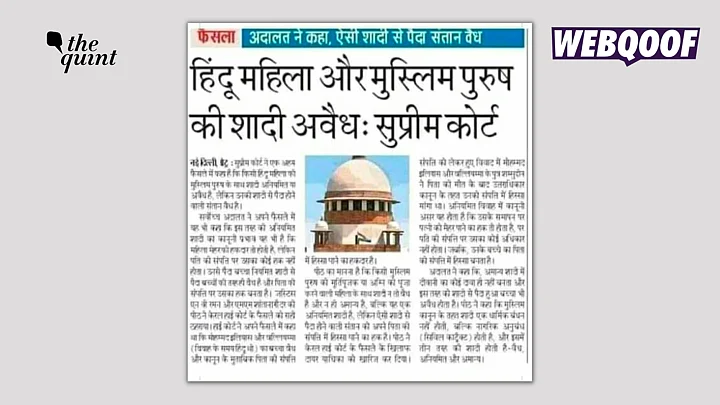A newspaper clipping with a headline that states that the Supreme Court (SC) has declared that marriages between Hindu women and Muslim men is considered invalid is being shared across social media platforms.
The Quint received a query about the claim's verification on its WhatsApp tipline. (Archives of more claims on social media can be seen here, here, and here.)
What's the truth?: The newspaper clipping refers to a specific case from 2019, wherein the petitioner had filed a case in the Kerala High Court, and later in the Supreme Court after being refused inheritance of his share of his ancestral property.
The Supreme Court has not made any such blanket judgment with respect to interfaith marriages.
How did we find out?: Using relevant keywords, we looked for more information on the newspaper clipping.
The search led us to an article by The Times of India, published on 22 January 2019, with a similar headline.
The article was about the Supreme Court upholding a Kerala High Court order regarding the legitimacy of the son of a couple, Mohammed Ilias and Valliamma, and him being legally entitled for share in his father's property.
The case was a notable one as Valliamma was Hindu at the time of her marriage to Mohammed Ilias, a Muslim man. The petitioner in the case – Shamsudeen – was born to the couple.
What did the judgment say?: We accessed a copy of the Supreme Court's judgment pertaining to this case for more clarity.
As per the judgment, Shamsudeen's paternal cousins had challenged his claim to the ancestral inheritance, citing the marriage between his mother (Valliamma) and his father (Mohammed Ilias) invalid on religious grounds.
The Kerala High Court while dealing with this case, referred to various Islamic texts (such as Mulla's Principles of Mahommedan Law and Syed Ameer Ali's Principles of Mahomeddan Law), and concluded that Muslim law did not consider the marriage void.
The high court said that Muslim law conferred legitimacy upon children born in such a wedlock.
It stated that the marriage between a Muslim man and a "fire worshipper" or "idolatress" was considered "irregular" but not void or invalid, as per Muslim law.
What about the Special Marriage Act?: The Special Marriage Act of 1954, too, does not prohibit marriage between a Hindu woman and a Muslim man.
According to this act, a couple must fulfil basic requirements of the Act – such as both being over 21-year-old, being of sound mind, not having a living spouse, etc. – for their marriage to be considered valid.
Conclusion: The news clipping being circulated to claim that marriages between Hindu women and Muslim men will be invalid is a case-specific judgment, and not a blanket judgment by the Supreme Court of India.
(Not convinced of a post or information you came across online and want it verified? Send us the details on WhatsApp at 9643651818, or e-mail it to us at webqoof@thequint.com and we'll fact-check it for you. You can also read all our fact-checked stories here.)
(At The Quint, we question everything. Play an active role in shaping our journalism by becoming a member today.)
